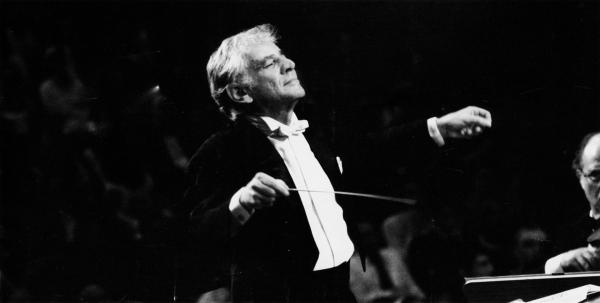REDISCOVER Leonard Bernstein at 100… and win his music!

February 06, 2018
In the annals of American Jewish music, no name looms larger than Leonard Bernstein. And for good reason. Aside from being a world-class conductor, Bernstein was a revered educator and celebrated composer, equally lauded for his work on the stages of both concert halls and theaters. Bernstein is also widely acknowledged for unabashedly putting his Jewish identity at the forefront of much of his work—despite urgings to change his name and conceal his Jewishness. (His reply to one mentor’s suggestion is now well known: “I'll do it as Bernstein or not at all!”)
Enter Our Leonard Bernstein Music Giveaway
5 Winners Will Receive 2 Full Albums on CD or Digital Download.
Winners will be drawn at random on Thursday, February 15th.
The Milken Archive’s recordings of Bernstein’s work span several albums, including several of his major works and a number of songs and chamber works—some of them recorded here for the first time. See below for an overview, links for further information, a playlist, and news of an exciting forthcoming exhibition.
Symphony No. 1 “Jeremiah”: Bernstein’s first symphony began with its ending three years prior to its completion. Bernstein had composed a “Hebrew song” based on a text from the Book of Lamentations in 1939. But when he began composing his first large-scale orchestral work in 1942 he realized that the Hebrew song would be a logical conclusion. Bernstein based the work on the biblical tale of Jerusalem’s destruction and named it after the prophet who foretold of it.
Symphony No. 3 “Kaddish”: It is no coincidence that Bernstein moved from biblical inspiration in the 1940s to a highly sacred text in the 1960s. (Nor is it a coincidence that the second symphony, "Age of Anxiety," is sandwiched between the two.) It has been described a piece of Mahlerian ambition and a clarion call of the atomic age. It is both tuneful and atonal, ethereal and terrifying. More than any other of Bernstein’s compositions, “Kaddish” represents the crisis of faith that so occupied his mind and work.
Video: Live performance of Chichester Psalms with Gerard Schwarz and the LA Philharmonic.
Chichester Psalms was commissioned by the Cathedral of Chichester, in Sussex, England, whose Dean wanted a liturgical work with a bit of popular flair. Bernstein was a natural choice and had the time, since another project had just fallen through. Chichester Psalms subsequently became one of Bernstein’s most performed concert works, combining the rhythmic verve of his Broadway musicals with slow, elegiac melodies.
Apart from these major works, the Milken Archive has brought a number of previously unrecorded Bernstein compositions to light. These include Four Sabras (solo piano character pieces based on seemingly prototypical Israelis); Israelite Chorus (incidental music to accompany Christopher Fry's The Firstborn); Invocation and Trance (a piano-vocal adaptation from his Dybbuk ballet); Psalm 148 (a Psalm of praise set as an art song); Rina (a spunky choral piece adapted from a previously composed holiday dance); Three Wedding Dances (piano vignettes on wedding themes composed for colleagues Adolphe Green and Phyllis Newman); Ḥalil (an homage to a fallen Israeli soldier and noted flautist); Simḥu na (Bernstein’s setting of a well-known Hebrew song; and several liturgical settings. For many of these smaller and earlier works, scores do not survive and thus had to be constructed from recordings and manuscripts.
Spotify playlist by Curator Jeff Janeczko featuring Leonard Bernstein's work in the Milken Archive
Follow the Milken Archive on Spotify
All Jewish-related in one way or another, these compositions illustrate the profound influence Bernstein’s Jewish experience and upbringing had on his artistic development. He wrote to the music director of his childhood synagogue, Solomon Braslavsky, that he would “probably never be able to estimate the real influence those sounds exerted on me.” In a similar manner, Bernstein’s influence continues to be felt.
ENTER THE GIVEAWAY »
View Artist Page » CD: A Jewish Legacy » CD: Chichester Psalms »
Leonard Bernstein: The Power of Music
As 2018 marks the 100th anniversary of Bernstein’s birth, organizations the world over are acknowledging his significant contributions to music and re-examining his complex and fascinating life. Among the most significant is the National Museum of American Jewish History’s forthcoming exhibit, Leonard Bernstein: The Power of Music, which will include interactive media, sound installations, artifacts, and a listening station featuring several Milken Archive recordings. The exhibit runs March 16th–September 2nd at the museum’s stunning galleries on Independence Mall in Philadelphia.

